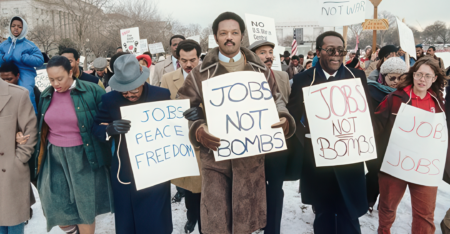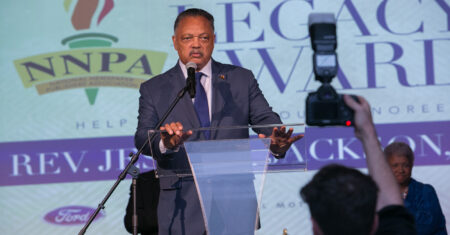By Stacy M. Brown
Black Press USA Senior National Correspondent
There are moments when a nation shows its soul. This is one of them.
Across America, millions are waiting for food assistance that will not come. The Trump administration’s refusal to release federal contingency funds for the Supplemental Nutrition Assistance Program — known as SNAP — has triggered what many are calling a man-made famine. For the first time in history, the federal government has deliberately stopped food aid during a shutdown. In New York, Governor Kathy Hochul stood before cameras, surrounded by advocates and families, and called the situation what it is: cruel. Nearly three million New Yorkers stand to lose benefits. She announced $30 million in state funds to cover 16 million meals, calling it a desperate measure to soften the blow of what she described as “the destruction Republicans in Washington are inflicting on our state.” “I am doing everything in my power to ensure New Yorkers do not go hungry this holiday season,” Hochul said. “No state can backfill these devastating cuts, but I am taking action to support families suffering the consequences of Republicans’ cruelty.”
The federal government’s refusal to act, she added, “is not a matter of policy, it’s a matter of humanity.” Her words echo across the country. From Boston to Baton Rouge, from Cleveland to Compton, governors and mayors are preparing for hunger on a scale unseen in decades. Massachusetts Governor Maura Healey called it historic for all the wrong reasons. “President Donald Trump is the first president in U.S. history to cut off SNAP benefits to people in America,” she said. In Washington, D.C., Mayor Muriel Bowser said the city cannot cover the $30 million shortfall to continue food benefits. “We need the federal government to do its part,” she said. Councilmember Christina Henderson described residents facing “death by a thousand cuts” as federal layoffs and social service reductions take hold. Virginia’s Governor Glenn Youngkin took a different path. He declared a state of emergency, blamed Democrats, and thanked Trump for his “continued support,” promising to use state funds to keep benefits flowing. Critics called it political theater. His order provided no clear plan for how the funds would reach the 850,000 Virginians who rely on SNAP each month.
In Maryland, officials have money in the treasury but refuse to spend it without a guarantee that Trump’s Department of Agriculture will reimburse them. “We are not going to gamble billions of taxpayer dollars while this administration turns its back on working families,” one official said. North Carolina Governor Josh Stein accused the administration of “a cruel abdication of responsibility.” His state has 1.4 million residents who depend on SNAP, including 580,000 children. “As temperatures cool and the Thanksgiving holiday approaches, refusing to use available funds is unconscionable,” he said. The numbers tell the rest of the story. Forty-two million Americans rely on SNAP every month. At least 25 states have already notified recipients that their benefits will stop on November 1. The list includes California, Arkansas, Mississippi, and New Jersey. Food banks are preparing for a surge they cannot handle. The New York Times reported that demand has already exceeded supply, with donations down and costs up. “When that social safety net breaks above us, we will be there to do as much as we can,” said Andrea Williams of the Oregon Food Bank. “And it will not be enough.”
ProPublica revealed that the Trump administration earlier canceled nearly 94 million pounds of food aid, including meat, eggs, and dairy, that were supposed to reach food banks nationwide. For those on the front lines, it was an invisible theft — food promised but never delivered. At the same time, the USDA has confirmed that it will not release $6 billion in federal contingency funds, claiming the money can only be used for “unforeseen events” such as natural disasters. The shutdown, apparently, does not qualify. Senator Kirsten Gillibrand said, “Republicans in Congress have needlessly shut down the government, and now they’re refusing to work with Democrats to maintain the benefits that put food on the table for millions of Americans.” Senator Peter Welch of Vermont was blunt. “This is all Trump,” he said. “He’s not engaged. He could care less.” Senator Mark Warner of Virginia agreed, calling it “outrageous” that the president is overseas while millions at home face starvation. “Stay in America. Put America first. Sit down with us and work this out,” Warner said.
Private companies have started doing what the government will not. DoorDash announced it would waive fees for food banks and deliver free groceries to families in need. “No one should go hungry in America,” said Max Rettig, the company’s vice president for public policy. “We know this is a stopgap, not a solution. But doing nothing isn’t an option.” In the Bronx, Representative Ritchie Torres said the effects are not theoretical. “SNAP is the difference between hunger and stability for over 150,000 families,” he said. “When Republicans in Washington threaten to cut food assistance, they are threatening to take meals off the tables of children, seniors, and working parents.”
The country is watching as food banks brace for impact, as parents skip meals to feed their kids, as a government chosen by the people turns away from them. The shutdown has now lasted more than four weeks. The lights in the Capitol still burn through the night, but the refrigerators in millions of homes do not. And as one food bank worker in New York put it, staring at a half-empty warehouse before the holidays, “They aren’t numbers on a page. They’re people. And they’re about to be hungry.”







